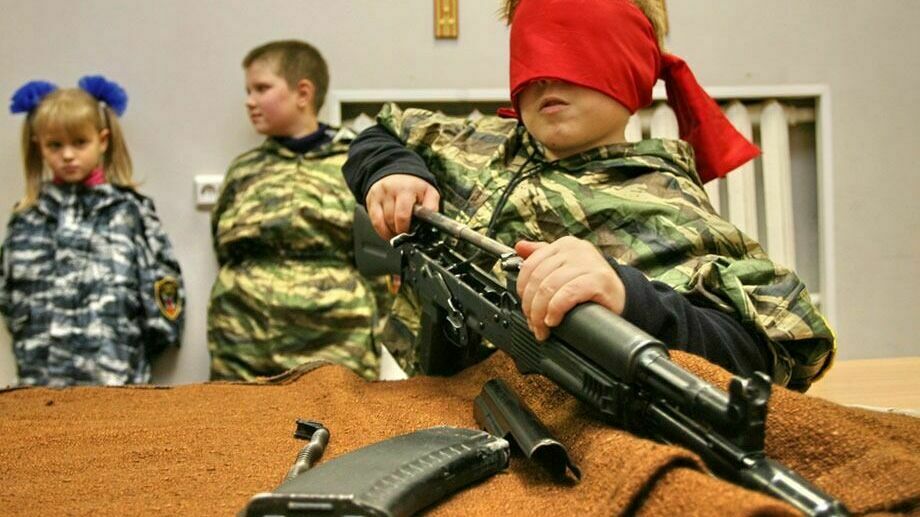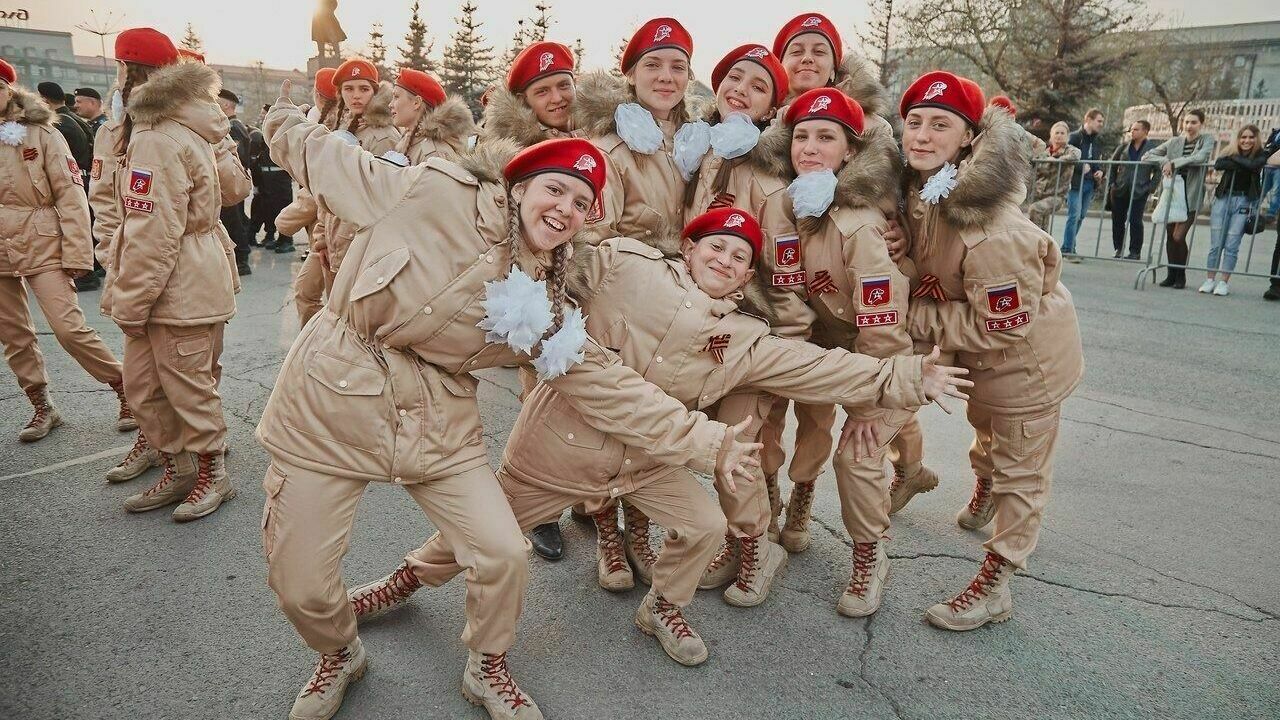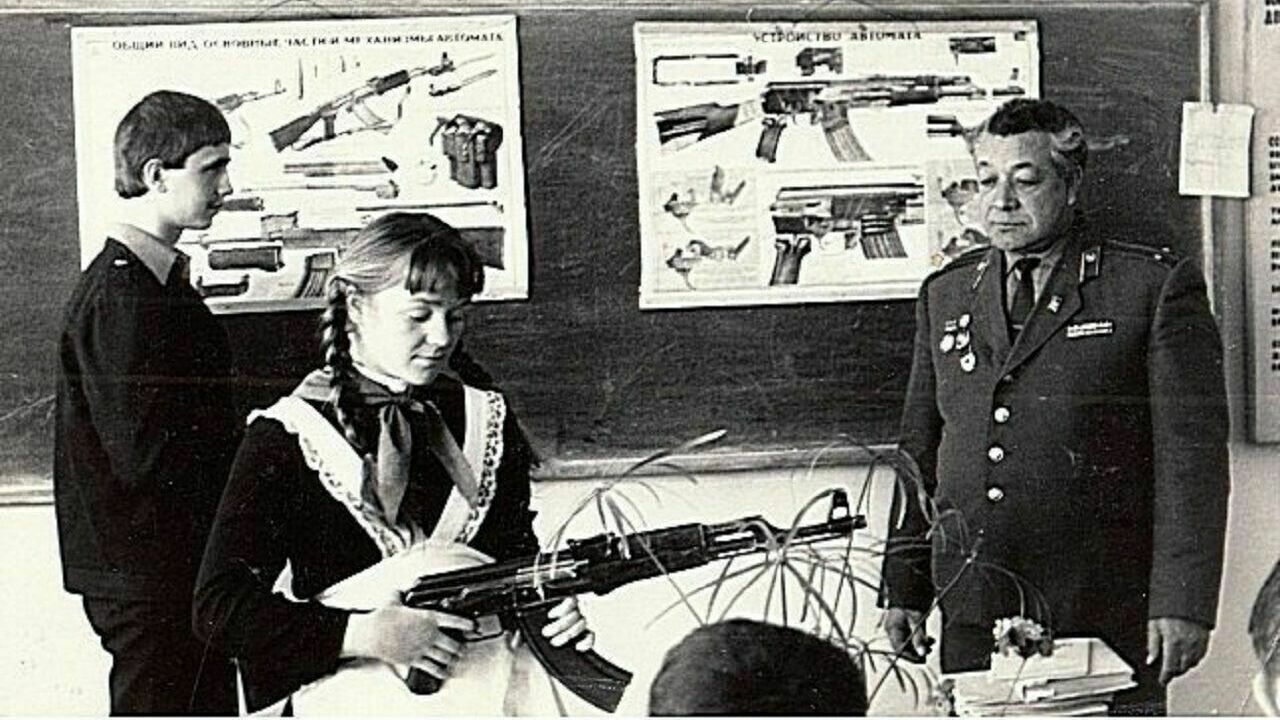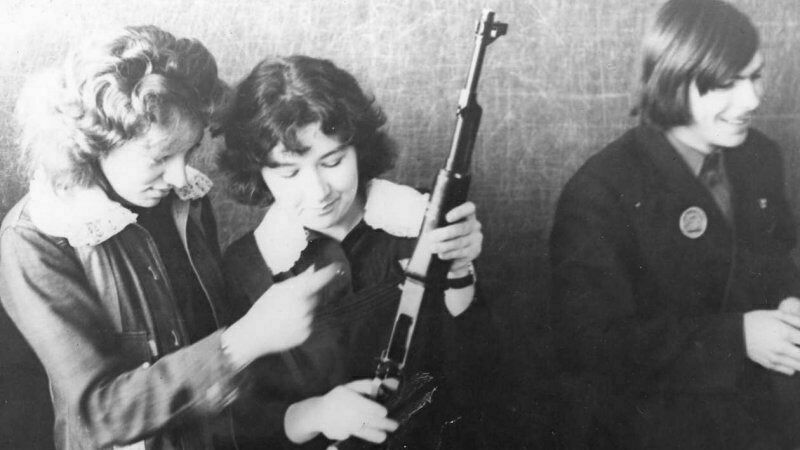Posted 19 января 2023, 07:46
Published 19 января 2023, 07:46
Modified 19 января 2023, 11:20
Updated 19 января 2023, 11:20

Military fashion: military training lessons are being introduced in schools
Irina Mishina
The course of initial military training will be introduced from the new academic year in grades 5-11 of schools, colleges, technical schools and colleges. The attitude to this innovation is ambiguous. So, according to the Superjob study, 62% of respondents supported the introduction of the primary military training course from the fifth grade. 23% were against it. However, this study does not indicate whether the parents of schoolchildren were participants in it.
Questions to the Minister of Education and not only
Remembering the primary military training course at the Soviet school, you involuntarily associate it with a military instructor in uniform, disassembling a Kalashnikov assault rifle and putting on a gas mask. But this time it seems to be different.
Deputy Minister of Education Alexander Bugayev has already said that participants of a special military operation in Ukraine can be invited as guests to military training classes in schools. At the same time, a person with a pedagogical education should conduct lessons, the official stressed. "The most important thing here is not to forget that this is a lesson, and the teacher leads the lesson," Bugaev noted.
In general, schools already have a considerable number of study hours in one way or another connected with politics. As you know, a special lesson "Conversations about important things" has been added since the new school year, and within the framework of the federal program "Dialogues with a Hero", participants of a special military operation come to schools with stories for thematic class hours. This is already happening, for example, in the Kurgan region.
No one, of course, is against patriotism, but why should this happen at the expense of the curriculum, which, as you know, is not "rubber"? Gradually, the voices of parents who consider raising a child a family matter began to be heard. So, the mother of a Moscow schoolboy Olesya Pavlova, for example, writes: "Children are not yet able to draw their own conclusions. They are too small and insufficiently informed for this. They do not know how to argue — the school does not teach them this, because the basis of school education is still total subordination. They cannot defend their point of view, because in a system of total subordination, such behavior entails consequences both in relation to the child and in assessing his knowledge. Children are defenseless, they actually have no rights. And tons of information are dumped on these defenseless, often intimidated little people, which they can neither realize nor critically comprehend".
The teachers also began to have questions. Until now, by the way, it is not clear who exactly will teach the lessons of primary military training: in some schools they say that a physical education teacher, in others – a social studies teacher. We decided to ask Dmitry Kazakov, a member of the Council of the interregional trade union "Teacher", a teacher of history and social studies at the secondary school of the village of Taremskoye in the Pavlovsky district of the Nizhny Novgorod region, about plans for primary military training.
"Only a person with a pedagogical education can teach any subject at school. Of course, there should be no discrimination against the participants of the SMO in Ukraine, but in order to teach a lesson at school, you must at least have an appropriate diploma. However, anyone can become a teacher lately. Numerous teacher training and retraining courses have appeared, which can be completed in 2 weeks, sometimes for a fee, and then receive a diploma. Of course, this is not comparable to the education received at the pedagogical institute. I'm not against primary military training, but there are a lot of "buts". The first is the base. To launch any subject, personnel and material and technical base are needed, otherwise all this will turn into a normal conjuncture, like "Conversations about important things", which have already been dubbed "Conversations about useless things", Dmitry Kazakov, a history and social studies teacher of the village of Taremskoye, Pavlovsky district, Nizhny Novgorod region, told NI.
"I would not dare to teach primary military training at school", admits Lieutenant General of the Ministry of Internal Affairs Alexander Mikhailov. – From experience, children do not understand the military well. It is important that the guys trust the person. How to find a common language with children in this topic is actually a very difficult question. It is important not to become the subject of jokes and memes, as it often happened with military instructors in Soviet schools, about which there are still a lot of jokes".
Guns at school: why is it dangerous
Among the military, there are also a lot of questions about the new subject, and about the very fact of the presence of a participant in the lesson.
"What can a person from the frontline tell? How did he kill? How were others killed? And why do children need this? It's great that they want to give them skills. But we need to understand what these skills are needed for. Here we have the Unarmia, for example. Children walk in formation and sing songs. Question: how will it be useful to them in life? How many yunarmeytsev got to Ukraine and proved themselves there during the special operation? Again, why disassemble the Kalashnikov assault rifle? In military field conditions, no one will ever disassemble it. And they are fighting with completely different weapons now. And is it necessary to devote schoolchildren to military secrets and secrets, which are always associated with the country's armament? As a result, won't it turn out that the NVP will limit itself to studying the charter of the guard service?", - says Lieutenant General of the Ministry of Internal Affairs Alexander Mikhailov.


Many also have a question: will teaching a subject so closely related to weapons lead to an increase in accidents and shootings in schools? Let's remember: after all, there have been a lot of such tragedies only recently.
- November 14 , 2019 At the Amur College of Construction in Blagoveshchensk, a 19-year-old student Daniil Zasorin opened fire with an IZH-81 rifle. The criminal started shooting towards the police, then shot himself. Besides him, 3 people were injured, two were killed.
- On May 11, 2021, a mass murder took place in Kazan at Gymnasium No. 175. A former gymnasium student, 19-year-old Ilnaz Galyaviev, set off an explosion and opened fire on people in the building with a Hatsan Escort PS smoothbore rifle. As a result of the attack, 9 people were killed - 7 students and 2 teachers, 32 people were injured.
- On October 18, 2021, in the village of Sars, Perm Krai, a 6th grade student brought a gun to school and started shooting, wounding an 11-year-old student.
- On December 13, 2021, Vladislav Struzhenkov, an 18-year-old graduate of the gymnasium, blew up an IED in Serpukhov at the gymnasium of St. Varlaam Serpukhov. As a result of the explosion, 13 people were injured, including the attacker.
- On September 26, 2022, at the Izhevsk School No. 88, its graduate Artem Kazantsev fired two Makarov traumatic pistols, killing 18 people, including 11 children, wounded 24 people and shot himself.
Will the talk about weapons become a reason for new tragedies?
"Here it is necessary to build a very correct methodology and teaching program, to develop children's immunity to terrorist attacks, to orient them to the fight against terrorism, for example, to tell about how the capture of drug dealers takes place. But it should be a system, not a set of phrases. It's generally the fashion for war now, but it's not really child's play. In general, in my opinion, as a result of the introduction of NVP, we are unlikely to train fighters", - said Lieutenant General of the Ministry of Internal Affairs Alexander Mikhailov.
"The school curriculum is not a sponge and not "rubber""
Recently, it often seems that the school is now more concerned with patriotic education than with actual training.
"It became known that many Russian schools were sent a manual on conducting a lesson telling students of grades 5-11 about anti-Russian sanctions. The lesson will be held as part of a social studies course. After the lesson, students will have to fill out a feedback questionnaire and answer the questions: "Are sanctions against Russia fair?", "Will sanctions lead to the strengthening of the Russian economy?", "Who will suffer great economic losses?" Three answers are offered to the last question: Russia, NATO countries, all countries of the world. I wonder if twelve-year-olds know the word NATO? Do they need to know this? Will it add peace of mind to their children's psyche?"
The question is also how to integrate primary military training into the educational process. Schoolchildren are already overloaded: in some schools, already in grade 7, there are 9-10 lessons a day plus homework, which often turn a student's "working day" into a 15-hour one, which is not comparable even with the loads of adults.
"There is an opinion among education officials that education is a sponge that will tolerate everything or rubber. Due to the reduction of hours in which subject will the primary military training be introduced? Or will it be extra hours? No one understands anything yet. And there are fears that the idea of patriotic education may result in its discrediting due to a formal approach, - says Dmitry Kazakov, a history and social studies teacher from the Nizhny Novgorod region. – We now have a fashion for war and patriotism among education officials. Lapta at school, labor education, "Talking about important things" ...Which of these became really useful for children? But education ultimately suffers".

